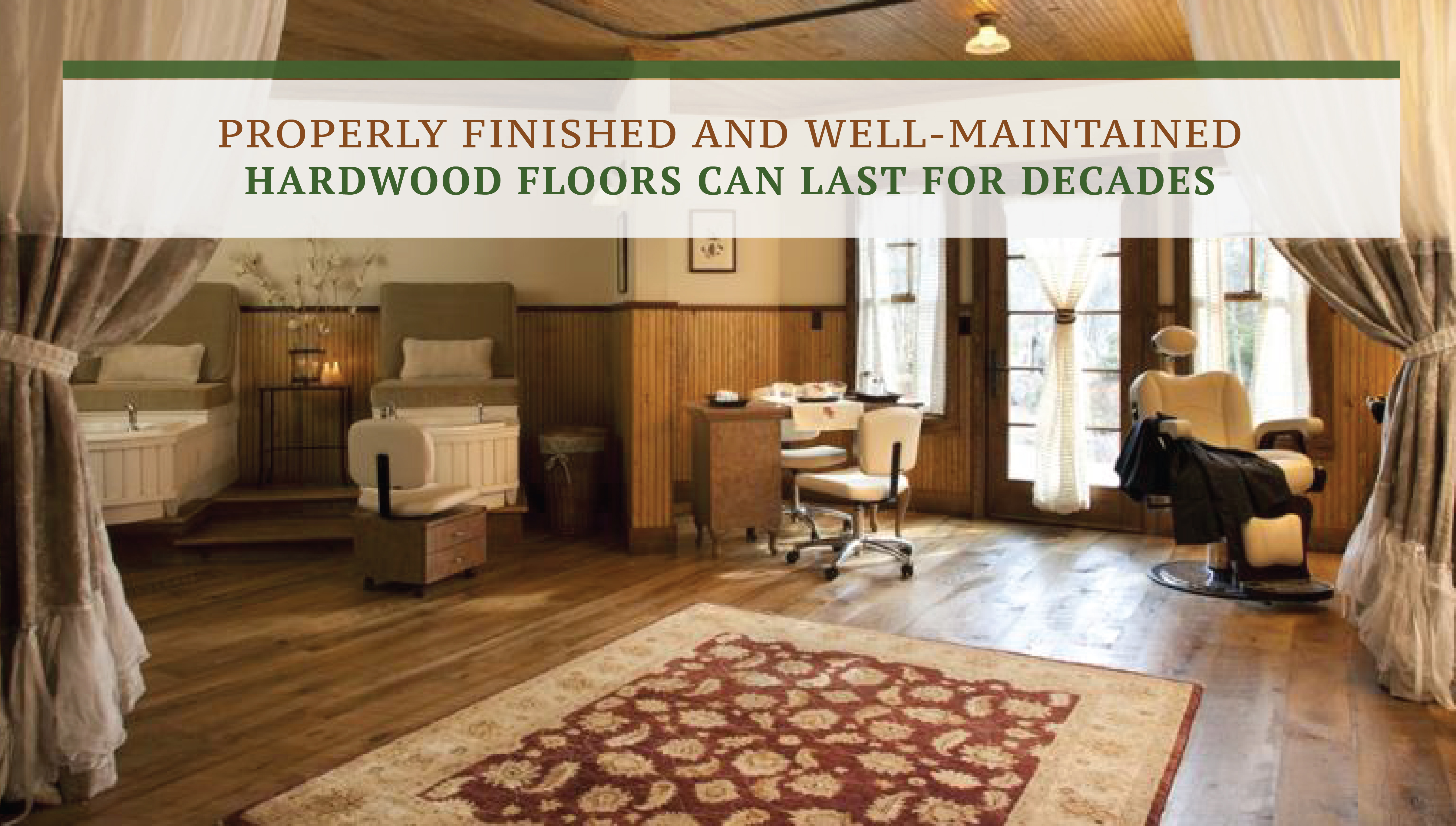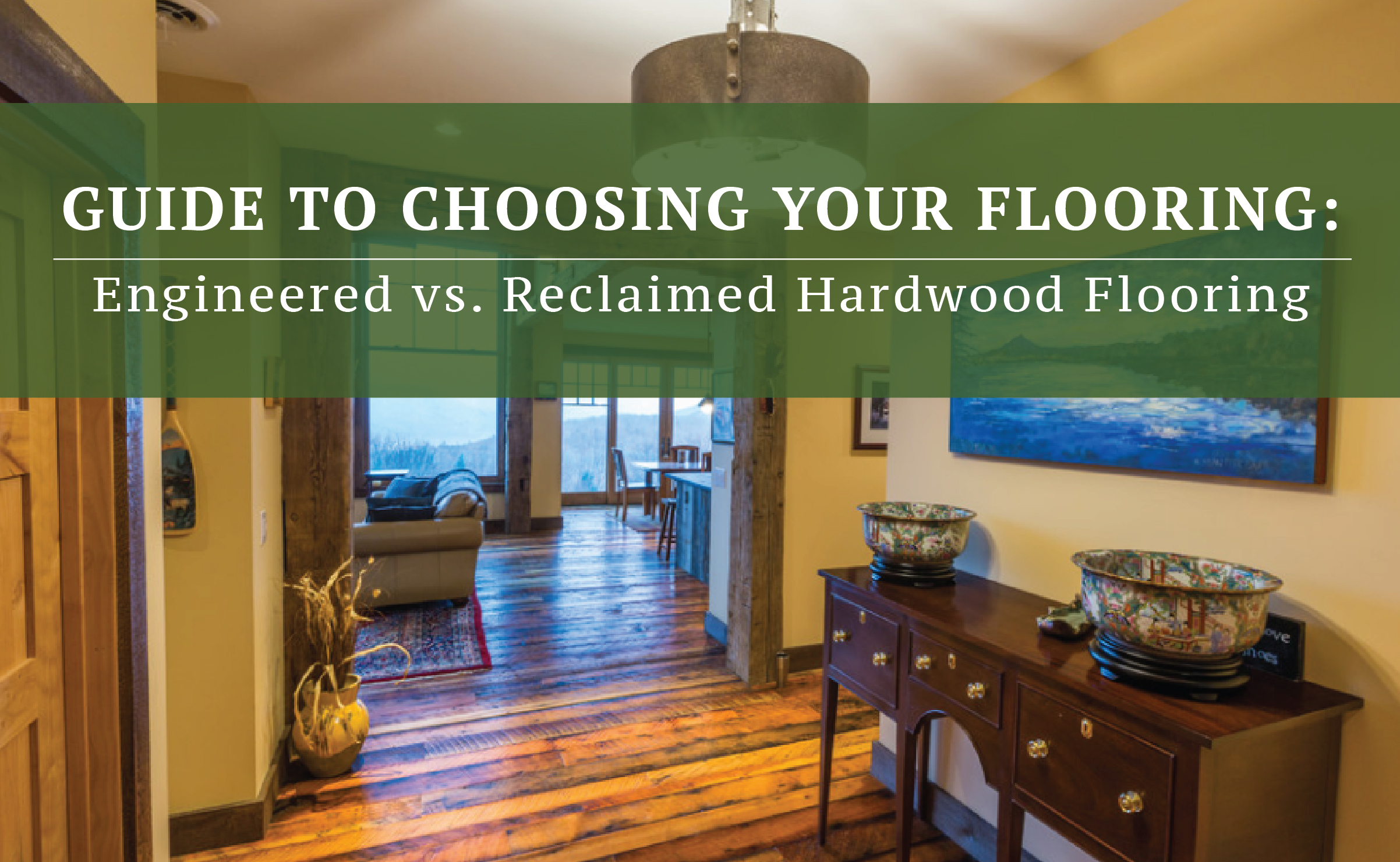Is Solid Reclaimed Hardwood or Engineered Hardwood Flooring Better for You?
Your home or business is that special place where you spend a great a deal of time and invest many of your resources. We all hope to achieve a beautiful, comfortable space, and installing wood flooring presents an opportunity to make your space warm and inviting.
Reclaimed solid hardwood flooring and engineered hardwood flooring are great choices to help you get the look you want, and they are durable types of flooring. While both options are made from real wood, there are differences in the construction and installation processes that you’ll want to consider.

Let Us Guide You Through the Woods
Making the decision between solid hardwood and engineered wood may seem daunting, but it doesn’t have to be. At Superior Hardwoods of Montana, guiding customers through the woods has been our passion since 1977.
We’ve written this online guide to help you understand the nuances involved with each flooring type so you’ll have the information to make the right decision for you. After reading this guide, you should be armed with enough information to decide what type of wood flooring is best for you, and our knowledgeable staff is available to help make your vision a reality.
Hardwood vs. Engineered Wood: Questions to Ask Yourself
When choosing engineered wood flooring over reclaimed wood flooring or vice versa, you must take several factors into consideration, including:
- What type of subfloor you have
- Whether you want to be able to refinish your floor
- What your budget is
- What type of wood you’d like
Your decision will be just as personal and unique as your space.
The moment you decide you want new flooring, you’ll probably think about how much money it will cost. That shouldn’t deter you, however. Wood flooring comes in reasonable prices and with ample benefits. Wood floors are investments of a lifetime. They create a healthier atmosphere that makes your home a desirable place to return to at the end of each day. And don’t forget aesthetics. Wood floors are always in style and keep up with current trends.
The Advantages of Choosing Hardwood Flooring
No matter what type of wood flooring you decide on, you’ll likely be very pleased with the decision to install it in your space. You receive financial, health, environmental and aesthetic benefits from choosing wood flooring. We’ll explore those details in this guide, as well as what’s involved in the process of installing wood floors.
Offering the highest-quality wood flooring is our goal. To ensure this, we have worked with our partners over the years who are equally knowledgeable and dedicated to providing excellent products. These relationships allow us to expand the list of options we offer and stock a variety of flooring that’s the largest selection in the western part of the United States.
Installing wood floors is a way to customize your home according to the needs and style preferences of you and your family. Whether you need the flexibility of using engineered wood on lower levels of your home, the option to stain unfinished wood to match your distinct taste, the charm and character of reclaimed wood, or the ease of prefinished wood, Superior Hardwoods of Montana has you covered.
Table of Contents
- Introduction/Chapter 1: Is Reclaimed Hardwood or Engineered Hardwood Flooring Better for You?
- Chapter 2: What Are the Benefits of Engineered Wood Flooring?
- Chapter 3: Reclaimed Wood Flooring Could Work for Your Project
- Chapter 4: Types of Prefinished Wood Flooring
- Chapter 5: Types of Solid Wood Flooring
- Chapter 6: How to Install Wood Floors
- Chapter 7: The Pros and Cons of Wood Flooring
- Chapter 8: Get Started with Your Wood Floors
Chapter 1: Why Go With Hardwood Instead of Carpet?
As you consider the reasons you might opt to install hardwood flooring, a very practical one is the relative simplicity of maintenance required for wood floors. When compared to carpet, wood floors are easier to keep clean.
Vibrant homes and workplaces see a lot of activity, which makes them both enjoyable and in need of proper care. Frequent treading on the floor results in wearing down these areas and tracking in dirt. In the carpet vs. hardwood debate, those factors have a major influence on the outcome. Let’s take a look at some things you should consider.
Maintaining Different Floor Types
People who have many guests, children or pets know that in addition to foot traffic patterns and normal wear-and-tear, floors are the target of the occasional spill or accident. Having an easy-to-clean surface increases the longevity and beauty of your floors.
The National Wood Flooring Association recommends regular maintenance by sweeping floors with a broom or dusting floors with a soft, dry mop. The association’s recommended maintenance schedule offers guidelines, such as:
- Sanding and refinishing a hardwood floor would likely only be necessary after a few decades
- Spills and debris are not hard to spot on hardwood floors, which makes it easier to ensure those things are completely cleaned up
Of course, individual use and circumstances will determine the upkeep necessary for your wood floors, but with regular sweeping or vacuuming followed by mopping, your hardwood floors should look great for many years to come.
Hardwood Vs. Carpet: Quantifying Dirt’s Impact on Carpet
While dirt can be easily removed and has little to no impact on the integrity of wood floors, it can be more detrimental to carpet. Dirt wears down the fibers of carpet, which is why higher-traffic areas of carpeted floors appear duller than the rest of the floor. Stains can also have largely negative effects on the livelihood of carpet.

In addition to wood floors being easier to keep clean than carpet, wood floors have proven more durable and long-lasting than carpet. Properly finished and well-maintained hardwood floors can last for decades while a top-quality carpet can last up to 15 years.
Hardwood Floors Increase a Home’s Resale Value
As with any investment, it’s smart to think about getting the most value out of it and even recouping a return on it if you choose to. Real estate is no doubt one of the biggest investments most people will ever make. Flooring is a key component in determining the value of real estate. Decisions about property are important, and the fact that buyers will pay more for hardwood than carpet has proven true time and again.
A 2013 study of homebuyer preferences using data from the National Association of Realtors found that more than half of the people looking to buy a home would pay about $2,000 more for a property with hardwood flooring than one without it. It did not break down whether hardwood vs. engineered wood made any difference.
Experts have a similar opinion as buyers regarding the value of wood floors in a home. The National Wood Flooring Association shared the results of a survey of real estate agents in the United States. The survey revealed:
- 99 percent of the real estate agents surveyed believe homes with hardwood floors are easier to sell.
- 82 percent of agents believe homes with wood floors sell faster
- 90 percent believe those homes sell for up to 10 percent more money

What Else Makes Wood a Good Choice?
Easy maintenance and increased value for your property are substantial reasons why wood flooring is a preferred option for your home or business, but the benefits don’t stop there.
Wood flooring may be better for your health than carpet because wood floors don’t trap allergens and microorganisms from the outside. Due to that fact, wood floors improve indoor air quality. Also, wood floors face a significantly lower risk of accumulating dust, mold and animal dander than carpet.
When it comes time to update the décor of your space, you can use area rugs on top of your wood flooring. The wood is beautiful on its own, and rugs give you the option to change up your home or business.
Wood may not only be good for you, your family and your lifestyle. Many also contend wood flooring is good for the earth. Wood is a sustainable, renewable and natural material. The National Wood Flooring Association cites several statistics that illustrate why wood flooring is an environmentally sound choice, including:
- Wood flooring is abundantly renewable. In fact, it is more renewable than any other flooring type. Once wood is no longer used for the purpose of flooring, you may burn it for fuel or recycle it for other uses.
- Wood flooring has an almost unmatched lifespan. Wood floors can potentially last centuries, which means they don’t need to be replaced as often as other flooring options.
- Trees regrow at a greater rate than they are harvested. For every cubic foot of trees harvested, one and two-thirds cubic feet of trees regrow.
The collection of trees planted today won’t be needed for more than a century from now, and it takes most hardwood trees only up to 60 years to mature.
